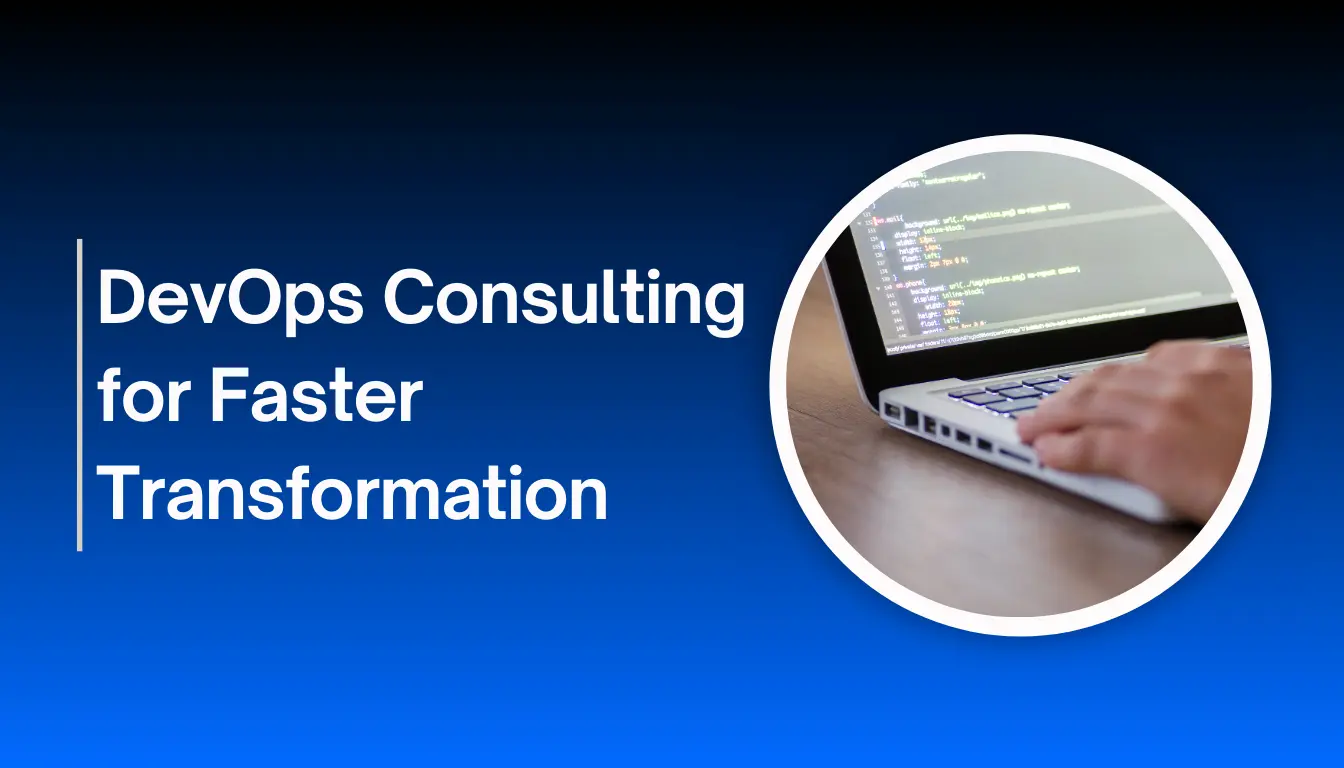Did you know that companies that fully embrace DevOps principles can deploy code up to 973 times more frequently than their competitors? In today’s digital-first world, that kind of speed isn’t a luxury; it’s a necessity for survival.
But the road to DevOps isn’t easy. It requires a fundamental shift in culture, processes, and technology, a journey that can be full of pitfalls. This is where DevOps consulting becomes not just helpful, but absolutely essential. A good consultant provides the expertise, a clear roadmap, and the external perspective needed to navigate this complex transition, making it the key to faster, more successful digital transformation.
The Role of DevOps in Digital Transformation
Digital transformation is about more than just technology; it’s a complete rethinking of how a business operates. DevOps is the methodology that makes this happen. By breaking down the traditional silos between development and operations teams, it creates a culture of collaboration, automation, and continuous improvement.
Breaking Down Silos
Before DevOps, developers would write code and “throw it over the wall” to operations, who were then responsible for deployment. This led to miscommunication, delays, and a lack of shared responsibility. DevOps brings these teams together, creating a unified, cross-functional team that owns the application from code to production. This shared ownership helps foster a more transparent and collaborative environment.
Driving Automation
The manual, repetitive tasks that once slowed down software delivery are now automated. This includes everything from code testing to infrastructure provisioning and deployment. The result is a continuous integration and continuous delivery (CI/CD) pipeline that allows teams to release new features and bug fixes quickly and reliably. Automation not only speeds things up but also drastically reduces the risk of human error.
Continuous Feedback
In a DevOps culture, feedback is constant. Teams use real-time monitoring and logging to understand how their applications perform in the wild. This data-driven approach allows for quick problem-solving and informs future development, ensuring that products are always getting better and better based on real user needs. It’s a never-ending cycle of improvement.
Why DevOps Consulting is Key to a Faster Digital Transformation
While the benefits are clear, implementing DevOps is a significant undertaking. A consultant brings specialized knowledge, outside perspective, and a structured approach that can prevent costly mistakes and accelerate your journey.
Providing a Clear Roadmap
Without a proper plan, a DevOps transition can feel overwhelming. A DevOps consulting firm can assess your current processes, identify bottlenecks, and create a tailored roadmap for your organization. This roadmap breaks down the transformation into manageable phases, from initial assessments to full-scale automation, providing a clear path to success.
Expertise in Tooling and Best Practices
The DevOps toolchain is vast and constantly evolving. A consultant helps you navigate this complex landscape, selecting the right tools for your specific needs, whether that’s for CI/CD, infrastructure as code, or monitoring. They bring a deep understanding of best practices, ensuring your pipelines are secure, efficient, and scalable from day one.
I remember working with a company that tried to pick its own tools. They spent months trying to integrate incompatible software, creating a Frankenstein-like system that was a nightmare to maintain. A consultant could have saved them that headache and put them on the right path immediately.
Cultural Change Management
DevOps isn’t just about tools; it’s about people. A consultant is a change agent who can facilitate workshops, provide training, and help get buy-in from all stakeholders. They help teams understand the value of collaboration and shared responsibility, making the cultural shift much smoother.
A Guide to Successful DevOps Implementation with a Consultant
Working with a DevOps consulting partner is a collaborative process. Here’s a step-by-step guide to what that looks like.
Initial Assessment and Goal Setting
- Current State Analysis: The consultant conducts a thorough review of your existing development and operations processes, tools, and culture.
- Business Goals Alignment: You work together to define clear, measurable objectives. Are you aiming for faster releases, better security, or reduced costs?
- Roadmap Creation: Based on the analysis, a detailed plan is created, outlining the tools to be used, the processes to be changed, and the expected timelines.
Implementation and Training
- Tooling Setup: The consultant helps you set up the necessary tools, such as automated build servers and deployment pipelines.
- Pilot Project: You start with a small, low-risk project to test the new processes and tools. This builds confidence and provides a learning experience for the team.
- Team Training: The consultant provides hands-on training to get your teams comfortable with the new tools and workflows.
Continuous Improvement and Handover
- Monitoring and Feedback: You establish systems for continuous monitoring to track performance, find bottlenecks, and gather feedback.
- Knowledge Transfer: The consultant ensures your internal teams have the skills and knowledge to manage the new system independently.
- Ongoing Support: The consulting relationship might continue with a focus on optimization and new strategic initiatives.
Tools of the Trade
A typical DevOps toolchain can include a variety of platforms for different stages of the software development lifecycle. Here is a table to compare some of the most popular tools.
| Category | Popular Tools | Function |
|---|---|---|
| CI/CD | Jenkins, GitLab CI/CD, GitHub Actions | Automates code builds, tests, and deployments. |
| Infrastructure as Code (IaC) | Terraform, AWS CloudFormation, Pulumi | Manages and provisions infrastructure through code, ensuring consistency. |
| Monitoring & Logging | Prometheus, Grafana, Datadog | Gathers metrics and logs to provide real-time insights into application performance. |
| Containerization | Docker, Kubernetes | Packages applications and their dependencies for consistent deployment across environments. |
Common Mistakes to Avoid
Trying to go it alone often leads to these common pitfalls.
Treating DevOps as Just a Tool
The biggest mistake is thinking you can simply buy some software and have a DevOps culture. It’s a mindset shift first and a set of tools second. Without the cultural change, automation will just make your existing bad processes run faster.
Skipping the Planning Phase
Rushing into implementation without a clear plan leads to a chaotic, ineffective setup. You need to know your goals and a roadmap to get there. Without it, you are just moving fast in the wrong direction.
Ignoring Security
Security is not an afterthought in DevOps; it is integrated from the start in a practice known as DevSecOps. Failing to build security into your pipelines creates a major risk. A consultant helps to embed security checks at every stage, from code analysis to production monitoring.
Expert Insights
Industry leaders and analysts are clear on the value of a structured DevOps approach.
“DevOps is the engine of digital transformation, and consulting is the mechanic that tunes it for peak performance.” – A technology analyst.
This analogy perfectly sums up the role of a consultant. They don’t just sell you a product; they provide the expertise to make your existing systems work better and faster.
“The true power of DevOps is not just in speed, but in the ability to create a high-trust, collaborative culture where every team member feels a sense of ownership.” – DevOps thought leader.
This quote highlights that the real, lasting benefits of DevOps are cultural, which is a major area where a consulting partner can provide immense value.
Key Takeaways
- DevOps consulting is a strategic investment that accelerates digital transformation.
- It helps break down silos, drives automation, and creates a culture of continuous improvement.
- A consultant provides a clear roadmap, expert tool selection, and essential cultural change management.
- Successful implementation requires a structured approach, starting with a pilot project and building from there.
- Ignoring security and treating DevOps as a purely technical problem are common mistakes to avoid.
Frequently Asked Questions
Why DevOps Consulting is Key to Faster Digital Transformation?
DevOps consulting is key to faster digital transformation because it provides the specialized expertise and structured roadmap needed to navigate a complex organizational change. Consultants help companies avoid common pitfalls, select the right tools, and, most importantly, facilitate the cultural shift toward collaboration and automation, which are the core tenets of a successful digital transformation.
What services do DevOps consulting firms offer?
They offer a range of services, including strategic planning and roadmap creation, CI/CD pipeline implementation, infrastructure as code (IaC) setup, cloud migration support, and DevSecOps integration. They also provide training and workshops to help your teams adopt the new culture and processes.
Is DevOps consulting only for large enterprises?
No, DevOps consulting is beneficial for companies of all sizes. While large enterprises might need help with complex legacy systems, startups and small businesses can use consultants to establish a solid, scalable foundation from the beginning, preventing technical debt and setting them up for long-term success.
How can a consultant help with the cultural aspect of DevOps?
A consultant acts as an unbiased third party who can facilitate communication between teams, provide training, and advocate for the new ways of working. They help to break down resistance to change and build a culture of shared responsibility and continuous learning.
Recommendations
The world is moving fast, and without an effective DevOps strategy, your business risks falling behind. The shift to a DevOps culture is a journey with many moving parts, from technology to people, and trying to do it all in-house can be costly and time-consuming. To accelerate your digital transformation and ensure your efforts are successful, consider partnering with a specialized DevOps consulting firm. They provide the expertise and guidance to get it right the first time, ensuring your business is not just keeping up but leading the way. Ready to unlock the full potential of your teams and technology? Contact us today for a consultation on building your custom DevOps roadmap.




















